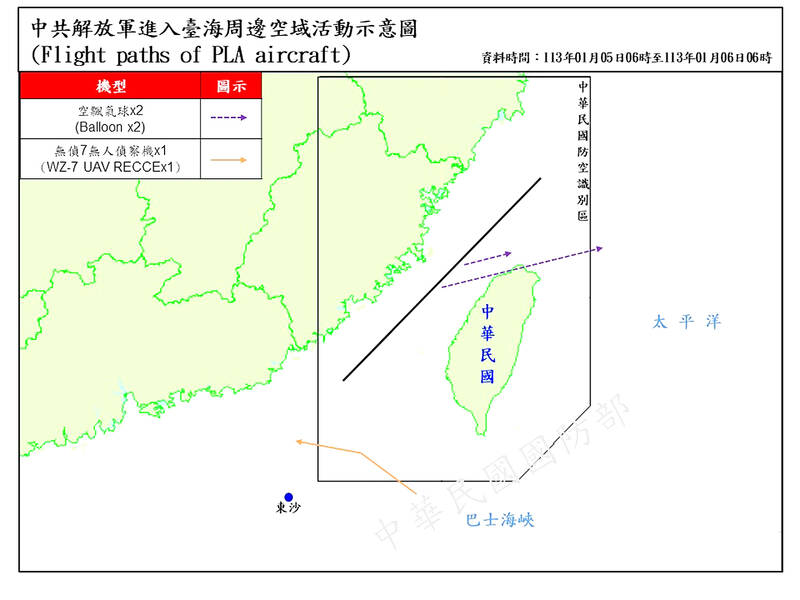China is threatening aviation safety and waging psychological warfare on the Taiwanese public with a spate of balloons spotted near or over Taiwan ahead of Saturday’s presidential and legislative elections, the Ministry of National Defense said yesterday.
The potential for China to use balloons for spying became a global issue in February last year when the US shot down what it said was a Chinese surveillance balloon.
China said the balloon was a civilian craft that accidentally drifted astray.

Photo courtesy of the Ministry of National Defense
Taiwan is on high alert for Chinese military and political activity ahead of the elections.
Taipei said China is exerting military and economic pressure in an attempt to interfere in the vote.
Since last month the ministry has reported several instances of Chinese balloons flying over the Taiwan Strait.
It said this week that some balloons had floated over Taiwan proper near major air bases.
The balloons were a “serious threat” to international aviation safety given their flight paths, it said in a statement yesterday.
“We also express our condemnation of the Chinese communists’ disregard for aviation safety and its disregard for the safety of passengers on cross-strait and international flights,” it said.
The ministry said that its analysis was that the balloons were part of China’s “gray zone” tactics against Taiwan “in an attempt to use cognitive warfare to affect the morale of our people.”
Asked whether it has shot down any of the balloons or intends to do so, the ministry said it would respond according to the altitude and possible purpose of airborne objects and the level of threat they pose.
So far, it has taken appropriate measures according to the “rules on responding to contingencies during normal times,” it said.
Calls seeking comment to the Chinese Ministry of National Defence, China’s Taiwan Affairs Office and the Chinese Civil Aviation Administration were not answered yesterday outside of work hours.
China’s defence ministry last week declined to comment on the balloons at a monthly news conference.
In a separate statement yesterday, the Ministry of Defense said that during the previous 24 hours it had detected two more Chinese balloons, one of which briefly flew over the far northern tip of the nation.
It said it thought the balloons were mostly for weather monitoring, driven by prevailing winds at this time of year, and the comments on them being part of China’s “gray zone” activities are stronger than previous statements.
A Western security source, speaking on condition of anonymity as they were not authorized to speak to the media, said that China was sending a very simple pre-election message to Taiwan with the balloons.
“We are watching you closely and you can’t hide,” the source said.
Additional reporting by CNA

Intelligence agents have recorded 510,000 instances of “controversial information” being spread online by the Chinese Communist Party (CCP) so far this year, the National Security Bureau (NSB) said in a report yesterday, as it warned of artificial intelligence (AI) being employed to generate destabilizing misinformation. The bureau submitted a written report to the Legislative Yuan in preparation for National Security Bureau Director-General Tsai Ming-yen’s (蔡明彥) appearance before the Foreign Affairs and National Defense Committee today. The CCP has been using cognitive warfare to divide Taiwanese society by commenting on controversial issues such as Taiwan Semiconductor Manufacturing Co’s (TSMC, 台積電) investments in the

INVESTIGATION: The case is the latest instance of a DPP figure being implicated in an espionage network accused of allegedly leaking information to Chinese intelligence Democratic Progressive Party (DPP) member Ho Jen-chieh (何仁傑) was detained and held incommunicado yesterday on suspicion of spying for China during his tenure as assistant to then-minister of foreign affairs Joseph Wu (吳釗燮). The Taipei District Prosecutors’ Office said Ho was implicated during its investigation into alleged spying activities by former Presidential Office consultant Wu Shang-yu (吳尚雨). Prosecutors said there is reason to believe Ho breached the National Security Act (國家安全法) by leaking classified Ministry of Foreign Affairs information to Chinese intelligence. Following interrogation, prosecutors petitioned the Taipei District Court to detain Ho, citing concerns over potential collusion or tampering of evidence. The

‘COMPREHENSIVE PLAN’: Lin Chia-lung said that the government was ready to talk about a variety of issues, including investment in and purchases from the US The National Stabilization Fund (NSF) yesterday announced that it would step in to staunch stock market losses for the ninth time in the nation’s history. An NSF board meeting, originally scheduled for Monday next week, was moved to yesterday after stocks plummeted in the wake of US President Donald Trump’s announcement of 32 percent tariffs on Taiwan on Wednesday last week. Board members voted to support the stock market with the NT$500 billion (US$15.15 billion) fund, with injections of funds to begin as soon as today. The NSF in 2000 injected NT$120 billion to stabilize stocks, the most ever. The lowest amount it

NEGOTIATIONS: Taiwan has good relations with Washington and the outlook for the negotiations looks promising, Minister of Economic Affairs J.W. Kuo said Taiwan’s GDP growth this year is expected to decrease by 0.43 to 1.61 percentage points due to the effects of US tariffs, National Development Council (NDC) Minister Paul Liu (劉鏡清) said at a meeting of the legislature’s Economics Committee in Taipei yesterday, citing a preliminary estimate by a private research institution. Taiwan’s economy would be significantly affected by the 32 percent “reciprocal” tariffs slapped by the US, which took effect yesterday, Liu said, adding that GDP growth could fall below 3 percent and potentially even dip below 2 percent to 1.53 percent this year. The council has commissioned another institution